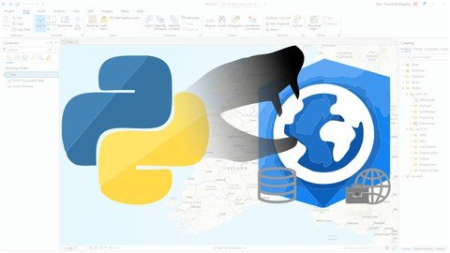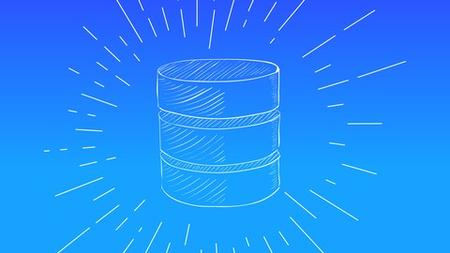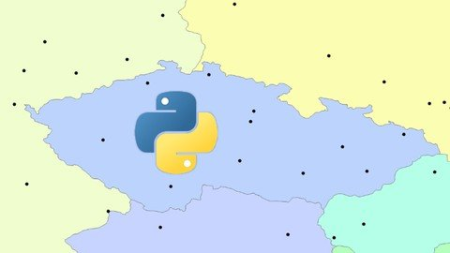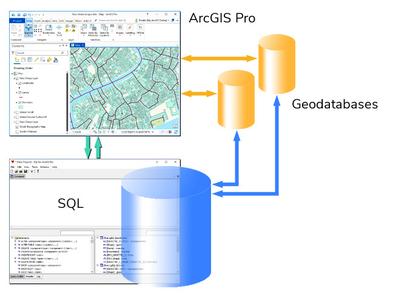
Arcpy For Data Management And Geoprocessing With Arcgis Pro
Posted on 08 Jun 05:40 | by LeeAndro | 22 views

Published 6/2023MP4 | Video: h264, 1280x720 | Audio: AAC, 44.1 KHzLanguage: English | Size: 7.41 GB | Duration: 9h 46m
Learn the fundamentals of ArcPy for data creation, management, manipulation, and querying using geoprocessing tools.
What you'll learn
Leverage ArcPy for Geospatial Data Management workflows.
Learn the fundamentals of ArcGIS Pro Geoprocessing tools using ArcPy.
Become familiar with ESRI documentation for ArcPy Geoprocessing tools and functions.
There's many ways to achieve a similar output, ArcPy offers many tools to achieve your goal.
Complete workflows that chain multiple Geoprocessing tasks.
Create a custom ArcTool for use in ArcGIS pro
Requirements
Basic knowledge of ArcGIS Pro
Basic knowledge of Shapefiles, File Geodatabases, Feature Classes, and Tables
Basic knowledge of Domains and Subtypes
Basic knowledge of Python
Basic knowledge of GIS core concepts.
Description
Want to stand out from the crowd A little code goes a long way! Gaining an understanding of ArcPy and how to apply automation with regards to geospatial data management, data manipulation, and analysis via Geoprocessing tools will aid with standing out from the crowd and get you noticed. ArcPy is in high-demand, so up-skill today and put yourself in this high-demand category.ArcPy is a fantastic ally for all your daily ArcGIS Pro tasks. This course will initially focus on using ArcPy for data management. Data management is often one of the most overlooked aspects of GIS and unfortunately can be the difference between a good GIS and a bad one. Good data practices open up the door for even better automation. Lists are a big factor in ArcPy workings. You will look at creating lists of various objects such as workspaces, feature classes, and fields for examples, and perform actions on different elements. You will look at using ArcPy to describe the various elements and use lists and descriptions to generate a comprehensive data catalogue. Adding to the data management side, the course slides into data validation rules with domains and subtypes. Domains are used to constrain the value allowed for a particular field. Basically, they enforce data integrity. You will look at the whole suite of tools available for domains, from creating and altering, to applying to a field. Subtypes are used to categorize your data. Think of a road network, you can categorize roads into primary, secondary, and tertiary roads for example. You can set defaults values on fields in each subtype category that is automatically applied when creating a new feature. Subtypes can be used in tandem with domains to improve data integrity.No we're getting into the heart of things. ArcPy is a great tool for creating templates and standardising your data structures. You will create a file geodatabase, a feature dataset, and a set of feature classes, all using ArcPy. We will take you through adding fields and take a look at a long list of tools associated with fields, from the Field Object itself, to creating a field (Add Field), altering a field, assign a default, field calculations, and mapping fields from one tool to another. There's no getting away from Excel in today's GIS society. This course will embrace that fact here and look at some conversion tools; Table to Excel, Excel to Table, and the Export Table that allows a more diverse choice such as a CSV. You will create a point dataset from an Excel file and save it to memory showcasing several tools that get the job done. ArcPy offers an array of data conversion tools.I'd like to say that cursors are the main event but that would be doing the rest of the material a huge injustice. Cursors will rapidly become a daily routine in your ArcPy life. Cursors are used to read and write attributes and geometries. You can use the Search Cursor to read through a dataset, the Update Cursor to update attributes and geometries, and the Insert Cursor to add new records. ArcPy boasts a host of general data tools to aid with data management, processing, and workflows. We will dive into them and perform checks; such as whether a dataset or data structure exists, testing for a schema lock; this is often the crux of geoprocessing that the data is locked, join datasets based on a common field, merge and append data.Where would we be without the analysis tools provided by ArcGIS Pro What about everyone's ultimate favourite tool, the Buffer Well, we can use ArcPy for that too, and many more. ArcPy provides the bed for repeatable geospatial analysis through automation.Selecting data with ArcPy enables you to perform geoprocessing tasks on the subset. The most notorious are Select Layer by Attribute and Select Layer by Location, but there are others patiently waiting their turn to be called into an ArcPy script.Finally, you will create a custom ArcTool for use in ArcGIS Pro as a GUI and chain geoprocessing tasks to achieve a desired output.This course uses PyScripter to write the Python code. You can use any code editor software that you prefer. The course solely focusses on ArcPy and no other third-party modules are utilized. The ArcPy for Data Management and Geoprocessing with ArcGIS Pro course requires a Basic license for ArcGIS Pro. Only tools and workflows that can be performed at the basic license level are used and assessed during the course.Please Note! ArcGIS Pro requires a license to use which is a paid license. You can get a 21-day free trial, or you can get a Personal Use license for a fraction of a Commercial license. It is recommended to get the free trial if you have no other access to ArcGIS Pro software.Your course instructor, Glen Bambrick, has over 15 years' experience with GIS and geospatial data, with over half of those years utilizing ArcPy on major projects to standardize and automate workflows.By the end of this course... you will be fully armed with the fundamentals of ArcPy for data management, manipulation, creation, analysis, and to perform repetitive workflows. You will have a deep understanding of capabilities of ArcPy and some knowledges of the nuances that can be encountered and how several tools can be used to achieve the same or similar output. The ideal student for this course would have some basic knowledge of Python and is somewhat familiar with ArcGIS Pro. No knowledge of ArcPy is necessary, after all, that is what this course is for.Want to stand out from the crowd Well what are you waiting for
Overview
Section 1: Introduction
Lecture 1 Introduction
Lecture 2 Course Data and Setup
Lecture 3 Getting the Most out of this Course!
Section 2: The Foundations Section
Lecture 4 The Foundations Section Overview
Lecture 5 Calling ArcPy Tools
Lecture 6 arcpy.env.{envSetting}
Lecture 7 From Manual Processing to Python Script
Lecture 8 AddMessage
Lecture 9 Good Memories: memory (and in_memory) workspace
Lecture 10 What a Result!
Section 3: The Lists Section
Lecture 11 The Lists Section Overview
Lecture 12 ListWorkspaces
Lecture 13 ListDatasets
Lecture 14 ListFeatureClasses
Lecture 15 ListTables
Lecture 16 ListRasters
Lecture 17 ListFields
Lecture 18 ListFiles
Lecture 19 ListIndexes
Lecture 20 Generate Data Catalogue Part 1 - arcpy.da.Walk
Section 4: The Describing of Data Section
Lecture 21 The Describing Data Section Overview
Lecture 22 Describe Object Properties
Lecture 23 Describe Shapefile
Lecture 24 Describe Feature Class
Lecture 25 Describe Workspace
Lecture 26 Describe Feature Dataset
Lecture 27 Describe Raster
Lecture 28 Describe Feature Layer
Lecture 29 arcpy.da.Describe
Lecture 30 Generate Data Catalogue Part 2 - arcpy.Describe
Section 5: The Almighty Creations Section
Lecture 31 The Almighty Creations Section Overview
Lecture 32 Create File Geodatabase (Data Management)
Lecture 33 Create Feature Dataset (Data Management)
Lecture 34 Create Feature Class (Data Management)
Lecture 35 Create Folder (Data Management)
Lecture 36 Make Feature Layer (Data Management)
Lecture 37 Create Standardized Project Folder & Data Structures - Part 1
Section 6: The Domains Section
Lecture 38 The Domains Section Overview
Lecture 39 Create Domain (Data Management)
Lecture 40 Add Coded Value To Domain (Data Management)
Lecture 41 Alter Domain (Data Management)
Lecture 42 Sort Coded Value Domain (Data Management)
Lecture 43 Delete Coded Value From Domain (Data Management)
Lecture 44 Set Value For Range Domain (Data Management)
Lecture 45 Domain To Table (Data Management)
Lecture 46 Table To Domain (Data Management)
Lecture 47 Delete Domain (Data Management)
Section 7: The Fields Section
Lecture 48 The Fields Section Overview
Lecture 49 Field Object
Lecture 50 Add Field (Data Management)
Lecture 51 Add Fields (multiple) (Data Management)
Lecture 52 Alter Field (Data Management)
Lecture 53 Delete Field (Data Management)
Lecture 54 FieldInfo
Lecture 55 FieldMap and FieldMappings
Lecture 56 Generate Data Catalogue Part 3
Section 8: The Subtypes Section
Lecture 57 The Subtypes Section Overview
Lecture 58 Set Subtype Field (Data Management)
Lecture 59 Add Subtype (Data Management)
Lecture 60 Set Default Subtype (Data Management)
Lecture 61 Remove Subtype (Data Management)
Section 9: The Polishing-off of Lists, Domains, Subtypes, and Fields Section
Lecture 62 The Polishing-off Section Overview
Lecture 63 ListDomains
Lecture 64 ListSubtypes
Lecture 65 Remove Domain From Field (Data Management)
Lecture 66 Assign Domain To Field (Data Management)
Lecture 67 Assign Default To Field (Data Management)
Section 10: The Cursors Section
Lecture 68 The Cursors Section Overview
Lecture 69 arcpy.da.InsertCursor
Lecture 70 arcpy.da.SearchCursor
Lecture 71 arcpy.da.UpdateCursor
Section 11: The Calculating Fields Section
Lecture 72 The Calculating Fields Section Overview
Lecture 73 Calculate Field (Data Management)
Lecture 74 Calculate Fields (multiple) (Data Management)
Lecture 75 Calculate Geometry Attributes (Data Management)
Section 12: The Conversions Section
Lecture 76 The Conversions Section Overview
Lecture 77 Table To Excel (Conversion)
Lecture 78 Excel To Table (Conversion)
Lecture 79 Make XY Event Layer (Data Management)
Lecture 80 Feature To Point (Data Management)
Lecture 81 Feature Class To Feature Class (Conversion)
Lecture 82 Feature Class To Shapefile (Conversion)
Lecture 83 Feature Class to Geodatabase (Conversion)
Lecture 84 Export Features (Conversion)
Lecture 85 Copy (Data Management)
Lecture 86 Copy Features (Data Management)
Lecture 87 Export Table (Conversion)
Lecture 88 Create Standardized Project Folder & Data Structures - Part 2
Section 13: The General Data Management Tools Section
Lecture 89 The General Data Management Tools Section Overview
Lecture 90 Exists
Lecture 91 TestSchemaLock
Lecture 92 Rename (Data Management)
Lecture 93 AlterAliasName
Lecture 94 Get Count (Data Management)
Lecture 95 Delete (Data Management)
Lecture 96 Truncate Table (Data Management)
Lecture 97 Delete Features (Data Management)
Lecture 98 Merge (Data Management)
Lecture 99 Append (Data Management)
Lecture 100 Find Identical (Data Management)
Lecture 101 Delete Identical (Data Management)
Lecture 102 Join Field (Data Management)
Lecture 103 Generate Data Catalogue Part 4
Section 14: The Analysis Tools Section
Lecture 104 The Analysis Tools Section Overview
Lecture 105 Buffer (Analysis)
Lecture 106 Multiple Ring Buffer (Analysis)
Lecture 107 Clip (Analysis)
Lecture 108 Generate Points Along Lines (Data Management)
Lecture 109 Near (Analysis)
Lecture 110 Generate Near Table (Analysis)
Lecture 111 Dissolve (Analysis)
Lecture 112 Pairwise Erase (Analysis)
Lecture 113 Minimum Bounding Geometry (Data Management)
Lecture 114 Create Fishnet (Data Management)
Lecture 115 Summarize Within (Analysis)
Lecture 116 Add Point Count (if Summarize Within fails)
Lecture 117 Spatial Join (Analysis)
Section 15: The Selects Section
Lecture 118 The Selects Section Overview
Lecture 119 Select Layer By Attribute (Data Management)
Lecture 120 Select Layer By Location (Data Management)
Lecture 121 Select (Analysis)
Lecture 122 Table Select (Analysis)
Lecture 123 Select with arcpy.env.extent
Lecture 124 Create Standardized Project Folder & Data Structures - Part 3
Section 16: The Creating ArcTools Section
Lecture 125 The Creating ArcTools Section Overview
Lecture 126 Generate Data Catalogues Tool
Lecture 127 Create New Project Tool
Lecture 128 Update Alias Tool
ArcGIS Pro users who want to b their automation adventures with ArcPy.,Geospatial Professionals who want to improve and innovate data management processes.,GIS Analysts who want to automate repetitive Geoprocessing tasks.
HomePage:
https://www.udemy.com/course/arcpy-for-data-management-and-geoprocessing-with-arcgis-pro/DOWNLOAD
rapidgator
https://rapidgator.net/file/8029ce3faf58c564ef7e504033528745/Meo9i5As__ArcPy_for_.part1.rar.html
https://rapidgator.net/file/061043e4cd1982a3249722d88bfd2520/Meo9i5As__ArcPy_for_.part2.rar.html
https://rapidgator.net/file/9790323cd95ce7a98f52d680e178b799/Meo9i5As__ArcPy_for_.part3.rar.html
https://rapidgator.net/file/6e41dacd8c21a7356e75e6f51827bf86/Meo9i5As__ArcPy_for_.part4.rar.html
https://rapidgator.net/file/a1823fb495bf82048111963351b2313b/Meo9i5As__ArcPy_for_.part5.rar.html
https://rapidgator.net/file/f5973a872e6bb6edf0bf177767cabae6/Meo9i5As__ArcPy_for_.part6.rar.html
https://rapidgator.net/file/0deeda989ceef8db1f9e8185831db982/Meo9i5As__ArcPy_for_.part7.rar.html
https://rapidgator.net/file/2a0a05e0e6b13def490692f5e83e9e65/Meo9i5As__ArcPy_for_.part8.rar.html
ddownload
https://ddownload.com/os9cv36gc8l6/Meo9i5As__ArcPy_for_.part1.rar
https://ddownload.com/az889k9ttzpd/Meo9i5As__ArcPy_for_.part2.rar
https://ddownload.com/t2axx5qhj2xy/Meo9i5As__ArcPy_for_.part3.rar
https://ddownload.com/c9xmhpdf6he1/Meo9i5As__ArcPy_for_.part4.rar
https://ddownload.com/ikd72q3ow2b0/Meo9i5As__ArcPy_for_.part5.rar
https://ddownload.com/9n1ryxx4k8dk/Meo9i5As__ArcPy_for_.part6.rar
https://ddownload.com/tx0mmkcp88ai/Meo9i5As__ArcPy_for_.part7.rar
https://ddownload.com/h6n6senshfxk/Meo9i5As__ArcPy_for_.part8.rar
Related News
System Comment
Information
 Users of Visitor are not allowed to comment this publication.
Users of Visitor are not allowed to comment this publication.
Facebook Comment
Member Area
Top News



